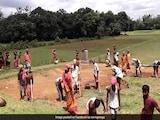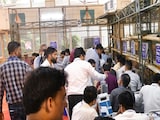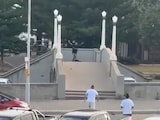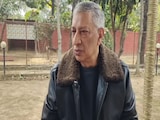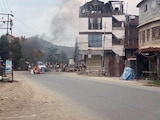John Kerry will meet Myanmar's Aung San Suu Kyi for Washington's first high level talks. (File Photo)
Naypyidaw:
United States Secretary of State John Kerry will meet Myanmar's Aung San Suu Kyi Sunday for Washington's first high level talks with her new civilian government, offering fresh support to her country's democratic progress after decades of army rule.
The brief visit to the capital Naypyidaw comes days after the US lifted a host of financial and trade embargoes in reward for reforms that saw elections sweep Suu Kyi and her party into office, ending half a century of military domination of the country.
Suu Kyi, who is Myanmar's foreign minister, also holds the newly-created position of state counsellor putting her at the helm of government in defiance of a constitution that bars her from the presidency. That role is now held by her longtime ally Htin Kyaw.
Kerry arrived in the capital on Sunday morning and is expected to later give a press conference with Suu Kyi, the pro-democracy figurehead who has received large reserves of political capital from Washington.
As he enters the twilight of his term in office, US President Barack Obama is doubling down on his "Asia pivot" -- a diplomatic strategy to engage the continent's leaders and tap its growing economies.
"We really want to demonstrate that democracy delivers. It'll be a short visit, but very symbolic," a State Department official said, adding that Kerry will be "looking for new ways to support this government."
In addition to November's landmark election, reforms so far have seen hundreds of political prisoners freed, the press unshackled from censorship and foreign investment flood into a country cut-off from the world by for so long by paranoid generals.
'Tension Remains'
Kerry is also expected to meet army chief Min Aung Hlaing, as Washington looks to coax further reforms from the military.
The army retains significant economic interests and political clout under a charter it scripted -- including a quarter of all parliamentary seats and control of key security ministries.
"Those kind of things really do need to go away so that Burma can truly identify as a full-blown democracy," the US official added, using Myanmar's colonial-era name.
Myanmar faces other huge challenges, including decrepit infrastructure, conflicts in resource-rich borderlands, religious tensions and the continued influence of the army and junta-era cronies, who still dominate the economy.
American investment in Myanmar remains relatively light, although some US companies including Coca-Cola and Pepsi, fast food restaurant KFC and carmakers Chevrolet and Ford have already established a sales presence.
Washington rolled back many of its sanctions to reward reforms since the end of outright military rule in 2011, but retains scores of names on its blacklists.
Last week the US Treasury opened up all Myanmar banks to American business, while also extending indefinitely permission for firms to import through Myanmar's ports and airports -- many of which are operated by cronies still on the blacklist.
But tension points remain.
In recent weeks Washington has come under pressure from hardline Buddhists after the US Embassy in Yangon used the term "Rohingya" to refer to the persecuted Muslim minority in the western state of Rakhine.
The term is incendiary to Buddhist nationalists who label the group "Bengalis" and view them as illegal immigrants from Bangladesh.
More than 100,000 Rohinyga languish in displacement camps following sectarian violence in 2012.
Myanmar's 1.1 million Rohingya are denied citizenship even though many can trace their roots in the country back generations.
Conceding it is a "sensitive issue" the State Department official reiterated America's stance that all people have the right "to self-identify, including the Rohingya."
Kerry is due to continue on to Vietnam Sunday, where he will accompany Obama to Hanoi and Ho Chi Minh City for a three-day visit likely to focus on trade, security and human rights.
The brief visit to the capital Naypyidaw comes days after the US lifted a host of financial and trade embargoes in reward for reforms that saw elections sweep Suu Kyi and her party into office, ending half a century of military domination of the country.
Suu Kyi, who is Myanmar's foreign minister, also holds the newly-created position of state counsellor putting her at the helm of government in defiance of a constitution that bars her from the presidency. That role is now held by her longtime ally Htin Kyaw.
Kerry arrived in the capital on Sunday morning and is expected to later give a press conference with Suu Kyi, the pro-democracy figurehead who has received large reserves of political capital from Washington.
As he enters the twilight of his term in office, US President Barack Obama is doubling down on his "Asia pivot" -- a diplomatic strategy to engage the continent's leaders and tap its growing economies.
"We really want to demonstrate that democracy delivers. It'll be a short visit, but very symbolic," a State Department official said, adding that Kerry will be "looking for new ways to support this government."
In addition to November's landmark election, reforms so far have seen hundreds of political prisoners freed, the press unshackled from censorship and foreign investment flood into a country cut-off from the world by for so long by paranoid generals.
'Tension Remains'
Kerry is also expected to meet army chief Min Aung Hlaing, as Washington looks to coax further reforms from the military.
The army retains significant economic interests and political clout under a charter it scripted -- including a quarter of all parliamentary seats and control of key security ministries.
"Those kind of things really do need to go away so that Burma can truly identify as a full-blown democracy," the US official added, using Myanmar's colonial-era name.
Myanmar faces other huge challenges, including decrepit infrastructure, conflicts in resource-rich borderlands, religious tensions and the continued influence of the army and junta-era cronies, who still dominate the economy.
American investment in Myanmar remains relatively light, although some US companies including Coca-Cola and Pepsi, fast food restaurant KFC and carmakers Chevrolet and Ford have already established a sales presence.
Washington rolled back many of its sanctions to reward reforms since the end of outright military rule in 2011, but retains scores of names on its blacklists.
Last week the US Treasury opened up all Myanmar banks to American business, while also extending indefinitely permission for firms to import through Myanmar's ports and airports -- many of which are operated by cronies still on the blacklist.
But tension points remain.
In recent weeks Washington has come under pressure from hardline Buddhists after the US Embassy in Yangon used the term "Rohingya" to refer to the persecuted Muslim minority in the western state of Rakhine.
The term is incendiary to Buddhist nationalists who label the group "Bengalis" and view them as illegal immigrants from Bangladesh.
More than 100,000 Rohinyga languish in displacement camps following sectarian violence in 2012.
Myanmar's 1.1 million Rohingya are denied citizenship even though many can trace their roots in the country back generations.
Conceding it is a "sensitive issue" the State Department official reiterated America's stance that all people have the right "to self-identify, including the Rohingya."
Kerry is due to continue on to Vietnam Sunday, where he will accompany Obama to Hanoi and Ho Chi Minh City for a three-day visit likely to focus on trade, security and human rights.



